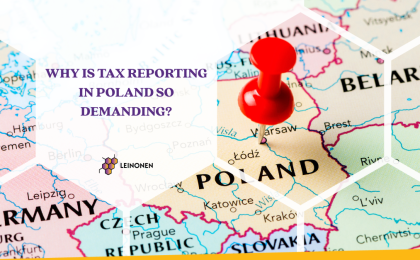Situated within central Europe, Poland has close ties to the rest of the European Union (EU). It boasts a modern, investor friendly environment and offers a variety of grants, EU funds, and innovation incentives for small to medium enterprises (SMEs) and startups.
Poland is an attractive destination for foreign-owned businesses looking to expand, and choosing the right business entity in Poland will set your company up for operational success, tax efficiency, and compliance from the outset.
In this article, Leinonen experts will explore Poland’s main business entities, comparing their impacts on accounting, tax, and more for foreign-owned businesses in Poland.
Main Legal Entities in Poland
- Sole proprietorship (Jednoosobowa działalność gospodarcza / JDG)
- Civil law partnership (Spółka cywilna)
- Registered partnerships (Spółka jawna / Sp.j.)
- Professional partnerships (Spółka partnerska / Sp.p.)
- Limited partnership (Spółka komandytowa / Sp.k.)
- Limited joint-stock partnership (Spółka komandytowo-akcyjna / S.K.A.)
- Limited liability company (Spółka z ograniczoną odpowiedzialnościa / Sp. z o.o.)
- Joint-stock company (Spółka akcyjna / S.A.)
- Simple joint-stock company (Prosta spółka akcyjna / P.S.A.)
- Branch of a foreign company
- Representative office
What are the Most Commonly Used Business Entities in Poland?
Limited liability company, sole proprietorship, joint-stock company, and branch of a foreign company/representative office are the most popular business entities in Poland.
- Limited liability company is a business entity in Poland that is highly favoured among both local and foreign investors, thanks to its liability protection and low capital requirement. Overall, limited liability companies offer the best balance of protection, credibility, and flexibility.
- Sole proprietorship is generally favoured by freelancers and small businesses due to its low cost and simplicity, but it can be risky for larger or more unpredictable ventures due to its unlimited liability.
- Joint-stock company tends to be used by large enterprises, especially those seeking public listing or significant capital raising.
- Branch and representative office are used by foreign-owned businesses looking for entry into the Polish market without full incorporation. Fast market entry is possible with a branch, but the parent company holds liability. Representative offices are low cost, but cannot trade (marketing and promotion only).
Formation Procedures for Legal Entities in Poland
Limited Liability Company
Setup can be completed online using the S24 system if contributions are made only in cash (typically this takes 1-5 days). However, a notarial deed is usually required, which takes 1-2 months. Articles of association, proof of capital, IDs, and a local address should be provided for registration. Costs include a registration fee of PLN 250-600, notary fees if applicable, and optional legal fees.
Sole Proprietorship
An individual can register for sole proprietorship online through the Business Activity Central Register and Information Record System (CEIDG) within 1-3 days. Registration is free, so costs are kept minimal, and articles of association are not required.
Joint-stock Company
To set up a joint-stock company, registration in the National Court Register (KRS) is required, and articles of association must be authenticated by a notary. The cost of forming a joint-stock company can be higher due to notarial and publication requirements, and the process usually takes 2-6 weeks.
Branch of a Foreign Company
A branch of a foreign company acts as an extension of a foreign-owned business in Poland. KRS registration is required, and a local address and parent company documents must be provided. The cost of setting up a branch is similar to setting up a limited liability company, and typically takes 2-4 weeks in total.
Representative Office
A representative office is limited to promotion and marketing, and must be registered with the Polish Ministry of Development. It costs less than registering a branch or company, and usually takes 2-4 weeks.
Capital and Ownership Requirements for Business Entities in Poland
| Entity | Minimum Capital | Shareholders | Directors | Other Notes |
|---|---|---|---|---|
| Limited liability company | PLN 5,000 | 1+ | 1+ (no nationality or residency restrictions) | Foreigners can own 100% of shares, and the director and shareholder can be the same person. |
| Joint-stock company | PLN 100,000 | 1+ | 2-tier board (management and supervisory) | This business entity in Poland may offer shares to the public, and can be foreign owned with no nationality restrictions. |
| Sole proprietorship | – | 0 | 0 | Only natural persons, owner = operator. Owner must hold EU, European Free Trade Association (EFTA), Swiss or United states (US) citizenship, or have a Polish residence permit. |
| Branch of a foreign company | – | 0 | 0 | Parent company appoints branch manager. |
| Representative office | – | 0 | 0 | Parent company appoints representative. |
Tax in Poland for the Main Legal Entities
Corporate Income Tax and Personal Income Tax
Business entities in Poland may be subject to Corporate Income Tax (CIT), Personal Income Tax (PIT), and Value Added Tax (VAT), depending on the company form and size.
For example:
- Limited liability companies and joint-stock companies are subject to CIT at a rate of 19% (or 9% for small taxpayers)
- Partnerships are generally tax transparent, with profits being subject to single taxation at partner level
- As sole proprietorships are comprised of one owner/operator, profits are classed as personal income and are therefore subject to PIT – either at progressive rates of 12% or 32%, a flat 19%, or a lump-sum for certain activities
- Branches are taxed as a non-resident entity at 19% CIT on Polish sourced income (or 9% for small taxpayers)
- Representative offices are limited to promotional and marketing activities and therefore do not generate income subject to CIT
Value Added Tax
Companies in Poland are required to register for VAT when turnover exceeds PLN 200,000 per year, but there is no minimum threshold for foreign companies. The standard rate of VAT in Poland is 23%.
Dividend Tax
For limited liability companies and joint-stock companies, profits are taxed at company level (CIT), then at shareholder level (Dividend Tax). Profits distributed as dividends are subject to 19% Withholding Tax (which may be reduced by EU parent-subsidiary directives or treaties).
Audit and Accounting Requirements for Legal Entities in Poland
Limited Liability Companies and Joint-stock Companies
Limited liability companies and joint-stock companies are required to keep full accounting books and prepare annual financial statements.
If at least two of the following conditions were met in the previous year, audit is also mandatory:
- Assets in excess of EUR 3,125,000
- Revenue in excess of EUR 6,250,000
- Average employees in excess of 50
Sole Proprietorship and Small Partnerships
Sole proprietorships and small partnerships can use simplified accounting, providing their revenue does not exceed EUR 2 million.
Branches and Representative Offices
Full accounting is required for branches, but minimal reporting is needed for representative offices. This is because they are restricted to marketing and promotional activities.
Legal and Operational Considerations
Most legal entities in Poland can engage in any lawful business and hire staff. The main difference is representative offices; these entities are limited to promotion and marketing and cannot hire staff. Branches can employ locally.
In a limited liability company or joint-stock company, shareholders’ liability is limited to their capital, but sole proprietors and general partners within partnerships have unlimited liability.
Choosing a Legal Entity in Poland
Choosing the right legal entity is a crucial step towards establishing a successful presence as a foreign-owned business in Poland.
Here are a few key questions to ask yourself:
- Do you want to attract investors? Limited liability companies and joint-stock companies are typically the most attractive company forms to investors.
- Do you want to attract foreign investors? A limited liability company or branch could provide the operational flexibility and limited liability you need.
- Do you want to limit your liability? Consider choosing limited liability company or joint-stock company.
- Is the business a joint venture? Depending on risk and tax planning, limited liability company or a partnership may be best.
Every foreign-owned business in Poland is unique, and the above are just a handful of scenarios to consider. For truly tailored advice on selecting the best business entity in Poland, it is vital to consult with an accounting and tax specialist like Leinonen Poland.
Recent Developments Affecting Legal Entities in Poland
A number of recent developments and incentives have been introduced that impact foreign-owned businesses in Poland.
Mandatory Audit Thresholds
In January 2025, thresholds for mandatory audit were changed as follows:
- Total balance sheet assets threshold was raised from EUR 2,500,000 to EUR 3,125,000
- Net revenue on sales of goods and products was raised from EUR 5,000,000 to EUR 6,250,000
Digitalisation
Like many EU countries, Poland is gradually digitalising its accounting and online registration systems. For example, the rollout of KseF is set to begin in 2026 starting with large taxpayers. This will introduce convenient and streamlined e-invoicing for businesses, and help prevent common issues like missing paper invoices.
What is the Most Popular Legal Entity for Foreign-owned Businesses in Poland?
In some countries, foreign businesses find setting up a branch to be an ‘easier’ option, but this is not the case in Poland. Most foreign-owned companies in Poland opt to set up a limited liability company; this choice offers greater independence and better legal protection.
A limited liability company can also help a business build a stronger local presence for a greater chance of success in the Polish market. Branches are generally only used when a parent company wishes to avoid creating a separate legal entity, or needs quick market entry.
Pinpoint the Right Legal Entity for Your Business With Leinonen Poland
While limited liability company remains the most versatile and popular legal entity, the right choice for your foreign-owned business in Poland will depend on your specific goals and operational plans. Consulting with an expert in accounting and tax in Poland will allow you to make an informed choice, so you can feel truly confident in your decision going forward.
Leinonen Poland has been a champion for foreign-owned businesses in Poland for more than 17 years, providing diligent and tailor made support for more than 80 clients. Our experts will offer invaluable local expertise on key accounting, tax, and payroll issues affecting your cross-border company as you venture into the vibrant Polish market.
Ready to access the personalised expertise you need to choose the right legal entity for your foreign-owned business in Poland? Organise a consultation with a local Leinonen Poland expert today.





